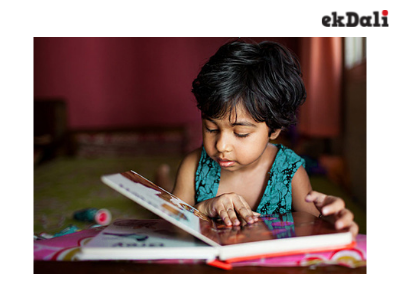While literacy is most commonly understood as reading and writing, there is a lot more to it. Before children can read and write, they need to learn about sounds, words, language, books and stories. Parents, teachers and other adults have a vital role to play in helping a child with early literacy development.
Literacy development is a vital part of your child’s overall development. It’s the foundation for doing well at school, play areas and socialising with others. But before your child learns to read and write, she needs to develop the building blocks for literacy – the ability to speak, listen, understand, watch and draw.
You can help with all these areas of your child’s early literacy development by:
-
communicating with your child frequently - Converse with your kid frequently
-
Reading together, reading aloud - Pick posters and books that kids love
-
Playing with rhyme and other sounds with your child
Conversations: Communicating for literacy development
Have simple conversations with your kid. Ask questions , reply in kind, use expressions to have deeper and longer conversations.
For example, you might notice your child responds to your smiles and baby talk. She might try to imitate your sounds and facial expressions. When you repeat your child’s early words, it encourages two-way conversation and helps your child learn words and build language skills.
-
Copy the sounds your baby makes and don’t be afraid to use baby talk. This is when you speak more slowly, let your voice rise and fall, and repeat and emphasise words.
-
Sing with your child.
-
Talk with your child about the everyday things you’re doing and seeing together. For example, ‘Let’s get the washing now’, ‘Look at the red bird’ or ‘Yum, what a nice lunch we’re having’.
-
Talk about feelings and chat about whether your child is happy or sad. You can help by giving her words to describe her emotions. This can help her understand how others feel too.
-
Share stories with your child. You could share funny or interesting stories from your childhood or tell your child about your family’s past. You could take turns creating a story together.
-
Teach your child that words can be broken down into segments. For example, ‘man’ is made up of m-a-n.
-
Listen to your child. Follow his lead and talk about things he brings up.
Reading: its importance in literacy development
It’s a good idea to read with your child. Make it a habit to read at the same time of the day as much as possible. It’s best to start reading from birth, but it’s never too late to begin. Reading with children from an early age helps them develop a solid foundation for literacy. It also promotes bonding and is good for your relationship with your child.
-
shows her that books can give both pleasure and information
-
helps her learn the sounds of letters in spoken language
-
helps her understand that stories aren’t coming from you, but from the words on the page – this teaches her about how the printed word works
-
Choose posters and books . You can borrow lots of different types of books from the library.
Rhyme: its importance in literacy development
Rhyming is a great way to teach children the connection between the sound of a word and how it’s written.
-
Play games that involve rhyming. Rhyming games help children appreciate beginning and ending sounds – for example, ‘cat, pat and mat’. You can play them at any time – in the car, while shopping or at the dinner table.
-
Play games that involve the sound and rhythm of words. You could try ‘I spy’ and tongue twisters like ‘She sells seashells by the seashore’
























